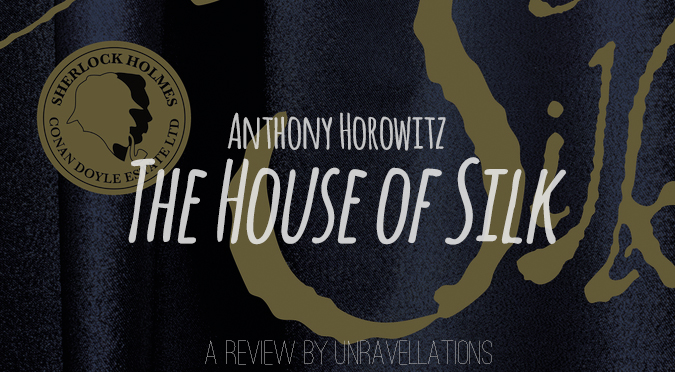
While I was reviewing Death On A Pale Horse, my attention was frequently directed to what a lot of reviewers viewed as a superior Sherlock Holmes canon extension – this book: The House of Silk, by Anthony Horowitz. Luckily, I had already borrowed it from the library and had lined it up behind Death On A Pale Horse on my reading list.
In many ways, The House of Silk would definitely come up as superior if you’re a bit of a purist. This is a good old-fashioned Sherlock Holmes romp, with our dear bungling narrator Dr. Watson, Holmes landing himself in trouble, the story setting never leaving England (unlike Death On A Pale Horse) and barely leaving London, a quest to uncover what lies behind a secret conspiracy and all that. I was very entertained throughout, and the plot chugs along at a pace, never leaving a boring moment.
There are two things I’d like to point out about The House of Silk, though.
Firstly, like most other spin-offs of famous works, there is a self-conscious way in which defining characteristics of Holmes are brought up, or canon stories are mentioned. For example, the novel begins with Holmes deducing Watson’s thoughts, then Watson exclaiming at the devilry of it all, Holmes explaining his logical processes, and Watson finally admitting that it was simplicity itself. This famous scene from the canon is so frequently used in spin-offs, adaptations and anything depicting Sherlock Holmes that I could honestly have done without it. It was done once, and brilliantly, in the original books. Enough of that. It is too fantastical to assume that such a specific scene could be replicated so many times in real life between two people. If I had been Watson, if Holmes tried to intrude upon our thoughts in such a manner for the second time, I certainly wouldn’t have been as surprised and incredulous as the first time, and would’ve been less than polite in extricating his methods from him. In my opinion, if a spin-off work aims to fit itself into a canon chronology of an original work, then it should note that these little references and scenes, of which the original work is famous for, is really unlikely to happen again at another time period, even if one would’ve liked to use it as a signifier that hey, this is the famous mind-reading Sherlock Holmes that we’re writing about.
Secondly – and this isn’t a negative point this time – Horowitz injects certain points of reflections in the story which I found interesting. In the novel, Watson is supposed to be writing about this adventure of the House of Silk from his declining years, when his wife, all his friends, including Lestrade and Holmes, have passed on. As such, it is realistic to assume that Watson would be looking back with a broader perspective of a wizened elderly man, so I liked this bit. It also served as a reason for Horowitz to criticize Doyle and the times he lived in. The poignant reflections I can remember off hand are: 1) the state of the London child beggars, treated as part of the streets itself and handled almost thoughtlessly by Doyle in the canon; 2) the personality of Lestrade, described as incompetent by Doyle, but Horowitz redeems him here and portrays him not only as being effective and resourceful for someone who doesn’t have a brain like Holmes’s, but also someone who, though he is frequently a mildly antagonistic competitor, is also a firm ally of Holmes to the end; and 3) the flitting presence of Mrs Hudson throughout the canon – Horowitz’s interpretation of Watson acknowledges that he barely took the time to get to know his landlady and didn’t know much about her beyond her showing in clients at Baker Street. I enjoyed reading these little points, though it pertains to the author’s own interpretation and criticism of the Holmes canon, but it ended a nice extra dimension and food for thought for fans reading this book.
All in all, I would recommend this book for lovers of mystery novels, and especially those who are already fans of the Holmes canon. It wouldn’t disappoint.
Spoilers ahead!


